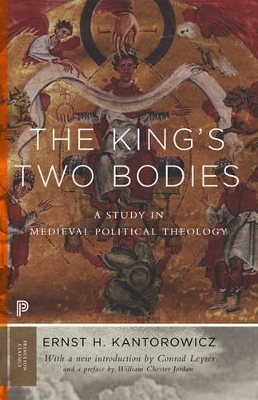
The King's Two Bodies
Princeton University Press (Verlag)
978-0-691-16923-1 (ISBN)
Bringing together liturgical works, images, and polemical material, The King's Two Bodies explores the long Christian past behind this "political theology." It provides a subtle history of how commonwealths developed symbolic means for establishing their sovereignty and, with such means, began to establish early forms of the nation-state. Kantorowicz fled Nazi Germany in 1938, after refusing to sign a Nazi loyalty oath, and settled in the United States. While teaching at the University of California, Berkeley, he once again refused to sign an oath of allegiance, this one designed to identify Communist Party sympathizers. He was dismissed as a result of the controversy and moved to the Institute for Advanced Study in Princeton, where he remained for the rest of his life, and where he wrote The King's Two Bodies. Featuring a new introduction, The King's Two Bodies is a subtle history of how commonwealths developed symbolic means for establishing their sovereignty and, with such means, began to establish early forms of the nation-state.
Ernst H. Kantorowicz (1895-1963) taught at the University of California, Berkeley, and was a member of the Institute for Advanced Study in Princeton. Conrad Leyser is associate professor of medieval history at Worcester College, University of Oxford. He is the author of Authority and Asceticism from Augustine to Gregory the Great. William Chester Jordan is professor of history at Princeton University. He is the author of From England to France: Felony and Exile in the High Middle Ages (Princeton).
Introduction to the Princeton Classics Edition ix Preface (1997) by William Chester Jordan xxv Preface xxxiii Introduction 3 I. The Problem: Plowden's Reports 7 II. The Shakespeare: King Richard II 24 III. Christ-centered Kingship 42 1. The Norman Anonymous 42 2. The Frontispiece of the Aachen Gospels 61 3. The Halo of Perpetuity 78 IV. Law-centered Kingship 87 1. From Litury to Legal Science 87 2. Frederick the Second 97 Pater et Filius Iustitiae 97 Iustitia Meciatrix 107 3. Bracton 143 Rex infra et supra Legem 143 Christus-Fiscus 164 V. Polity-Centered Kingship: Corpus Mysticum 193 1. Corpus Ecclesiae mysticum 194 2. Corpus Reipublicae mysticum 207 3. Pro patria mori 232 Patria religious and legal 232 Patriotic Propaganda 249 Rex et Patria 259 VI. On Continuity and Corporations 273 1. Continuity 273 Aevum 275 Perpetua Necessitas 284 2. Fictio Figura Veritatis 291 Imperium semper est 291 Universitas non moritur 302 VII. The King Never Dies 314 1. Dynastic Continuity 317 2. The Crown as Fiction 336 Corona visibilis et invisibilis 336 The Fiscal Crown 342 Inalienability 347 Crown and Universitas 358 The King and the Crown 364 The Crown a Minor 372 3. Dignitas non moritur 383 Phoenix 385 Corporational Symptoms in England 401 Le Roy est mort ... 409 Effigies 419 Rex Instrumentum Dignitatis 437 VII. Man-centered Kingship: Dante 451 IX. Epilogus 396 List of Illustrations 507 Illustrations following 512 Bibliography and Index 513 Addenda 568
| Erscheinungsdatum | 11.05.2016 |
|---|---|
| Reihe/Serie | Princeton Classics |
| Einführung | Conrad Leyser |
| Vorwort | William Chester Jordan |
| Zusatzinfo | 32 halftones. |
| Verlagsort | New Jersey |
| Sprache | englisch |
| Maße | 140 x 216 mm |
| Gewicht | 624 g |
| Themenwelt | Geschichte ► Allgemeine Geschichte ► Mittelalter |
| Geisteswissenschaften ► Geschichte ► Regional- / Ländergeschichte | |
| Geisteswissenschaften ► Religion / Theologie ► Christentum | |
| ISBN-10 | 0-691-16923-3 / 0691169233 |
| ISBN-13 | 978-0-691-16923-1 / 9780691169231 |
| Zustand | Neuware |
| Haben Sie eine Frage zum Produkt? |
aus dem Bereich


